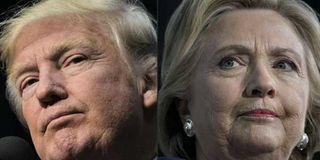US Democrats demand intel on Russian vote interference

A combined picture of US president-elect Donald Trump and Democratic presidential loser Hillary Clinton. AFP PHOTO
What you need to know:
- The Democratic legislators, already having been privately briefed by intelligence officials, suggest that there is more to the hacking story.
- Despite the conclusions of US intelligence, Trump has repeatedly rejected the idea that Moscow was behind the email leaks.
WASHINGTON
Top US Democratic lawmakers have demanded that President Barack Obama release details on alleged Russian interference in last month's election, fearing the issue will be swept under a rug when Donald Trump assumes office in January.
The Republican president-elect has repeatedly rejected the idea that Moscow had a hand in the private email releases that damaged rival Hillary Clinton and arguably helped his victory.
The legislators say they are not refighting the election, but want to make public what they believe was an effort by a foreign rival to erode the foundations of American democracy.
"By eroding Americans' and foreigners' trust in US institutions, Russia both weakens our country and sows global instability and uncertainty," leading House Democrats said in a letter to Obama Tuesday.
US intelligence officials announced on October 7, one month before the election, that "the Russian Government directed the recent compromises of emails from US persons and institutions, including from US political organisations."
"These thefts and disclosures are intended to interfere with the US election process," said the Department of Homeland Security and the Office of the Director of National Intelligence in a statement.
That was a reference to the release through WikiLeaks and other websites of emails stolen from the accounts of Clinton aide John Podesta and also from the Democratic National Committee, which embarrassed both the party and its White House nominee.
Susan Hennessey, a former NSA lawyer and now a cybersecurity expert at the Brookings Institution, said there were genuine grounds for concern, and that this was no mere politicking by resentful losers of the vote.
"This was an incredibly close election, and this was a significant event. That's why it's important to have a really serious response to this," she told AFP.
INTELLIGENCE
The Democratic legislators, already having been privately briefed by intelligence officials, suggest that there is more to the hacking story — and that it needs to be made public.
In a rare move, on November 29 Senator Ron Wyden and six other Democrats on the Senate Intelligence Committee pressed Obama in a letter to reveal more.
"We believe there is additional information concerning the Russian government and the US election that should be declassified and released to the public," they wrote.
There was no indication whether they were talking specifically about the hacked emails, or were also referring to Trump's business relations with Russia.
Released in a steady drip online in the months before the election, the emails clearly did damage. A batch of Democratic National Committee internal communications put out just ahead of the party convention in late July forced the resignation of DNC chair Debbie Wasserman Schultz.
They also revealed details on Clinton's paid speeches to Wall Street, which the campaign had sought to keep secret.
That gave rise to accusations that Moscow was aiding Trump, who has business interests in Russia and a less adversarial view of Russian President Vladimir Putin than the Obama administration and Clinton.
Despite the conclusions of US intelligence, Trump has repeatedly rejected the idea that Moscow was behind the email leaks.
"It could be Russia, but it could also be China. It could also be lots of other people. It also could be somebody sitting on their bed that weighs 400 pounds, OK? You don't know who broke in to DNC," he said in a September presidential debate.
And on Wednesday, when asked in an interview with Time magazine whether the intelligence was politicized, Trump answered: "I think so."
"I don't believe they interfered. That became a laughing point, not a talking point, a laughing point. Any time I do something, they say 'oh, Russia interfered.'"
"It could be Russia. And it could be China. And it could be some guy in his home in New Jersey."
The White House has yet to respond to the requests, and Republicans in Congress have been loath to back the effort, with some worried of the possible damage to a Trump presidency before it starts.
But after Trump's comments Wednesday, Republican Senator Lindsay Graham announced he will hold hearings on the issue next year.
Hennessey said fears of Russian political interference did not just concern the United States. She pointed to the WikiLeaks release last week of documents on Germany's BND intelligence agency that embarrassed Chancellor Angela Merkel just as she began campaigning for the elections slated for late 2017.
"With Hillary Clinton having been defeated, it is now clear that there is a relationship" between WikiLeaks and the Russian government, said Hennessey.





